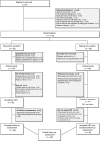Cognitive behaviour therapy for fatigued cancer survivors: long-term follow-up
- PMID: 17653075
- PMCID: PMC2360364
- DOI: 10.1038/sj.bjc.6603899
Cognitive behaviour therapy for fatigued cancer survivors: long-term follow-up
Abstract
An earlier randomised-controlled trial demonstrated the positive effects of cognitive behaviour therapy (CBT), especially designed for fatigued cancer survivors in reducing fatigue, functional impairments and psychological distress. In the current prospective study, we were able to examine the long-term effect of CBT in patients who completed the therapy. Predictors of fatigue severity at follow-up were exploratory investigated. Sixty-eight patients who completed CBT were assessed at pretreatment, post-treatment and at follow-up (mean follow-up 1.9 years (s.d. 1.0), range: 1-4 years). To analyse possible predictors of treatment outcome a linear regression (enter) was carried out. Improvements on fatigue severity, functional impairment and psychological distress after CBT appeared to remain stable during a follow-up period. Patients who were not fatigued anymore at follow-up were not different from a reference group of non-fatigued cancer survivors. The explorative regression analysis showed that fatigue severity, psychological distress and somatic attributions at pretreatment contributed to persistent fatigue severity at follow-up. Cognitive behaviour therapy, especially designed for post-cancer fatigue, is successful in reducing fatigue and functional impairment in cancer survivors. Moreover, these positive effects were maintained at about 2 years after finishing CBT.
Similar articles
-
Effects of cognitive behavior therapy in severely fatigued disease-free cancer patients compared with patients waiting for cognitive behavior therapy: a randomized controlled trial.J Clin Oncol. 2006 Oct 20;24(30):4882-7. doi: 10.1200/JCO.2006.06.8270. J Clin Oncol. 2006. PMID: 17050873 Clinical Trial.
-
Moderators and long-term effectiveness of cognitive behaviour therapy for fatigue during cancer treatment.Psychooncology. 2012 Aug;21(8):877-85. doi: 10.1002/pon.1981. Epub 2011 May 2. Psychooncology. 2012. PMID: 21538680 Clinical Trial.
-
The role of central and peripheral muscle fatigue in postcancer fatigue: a randomized controlled trial.J Pain Symptom Manage. 2015 Feb;49(2):173-82. doi: 10.1016/j.jpainsymman.2014.06.020. Epub 2014 Aug 21. J Pain Symptom Manage. 2015. PMID: 25150812 Clinical Trial.
-
Mindfulness and bodily distress.Dan Med J. 2012 Nov;59(11):B4547. Dan Med J. 2012. PMID: 23171754 Review.
-
[Follow-up of the long-term cancer survivor].Rev Med Suisse. 2017 May 17;13(563):1044-1048. Rev Med Suisse. 2017. PMID: 28636296 Review. French.
Cited by
-
Effects of Cognitive Behavioral Therapy for Depression and Anxiety, Response Rates and Adverse Events in Patients with Locoregional Advanced Nasopharyngeal Carcinoma.Integr Cancer Ther. 2021 Jan-Dec;20:15347354211006179. doi: 10.1177/15347354211006179. Integr Cancer Ther. 2021. PMID: 33784875 Free PMC article.
-
Humoral and cellular immune responses after influenza vaccination in patients with postcancer fatigue.Hum Vaccin Immunother. 2015;11(7):1634-40. doi: 10.1080/21645515.2015.1040207. Hum Vaccin Immunother. 2015. PMID: 25996472 Free PMC article.
-
Light therapy as a treatment of cancer-related fatigue in (non-)Hodgkin lymphoma survivors (SPARKLE trial): study protocol of a multicenter randomized controlled trial.BMC Cancer. 2018 Sep 10;18(1):880. doi: 10.1186/s12885-018-4746-2. BMC Cancer. 2018. PMID: 30200906 Free PMC article.
-
The Patient's Perspective on Proton Radiotherapy of Skull Base Meningioma: A Retrospective Cross-Sectional Survey.Front Oncol. 2022 Aug 5;12:677181. doi: 10.3389/fonc.2022.677181. eCollection 2022. Front Oncol. 2022. PMID: 35992835 Free PMC article.
-
Symptom-based interventions to promote quality survivorship.Neuro Oncol. 2018 Nov 9;20(suppl_7):vii27-vii39. doi: 10.1093/neuonc/noy100. Neuro Oncol. 2018. PMID: 29905840 Free PMC article.
References
-
- Aaronson NK, Ahmedzai S, Bergman B, Bullinger M, Cull M, Duez NJ, Filiberti A, Flechtner H, Fleishman SB, de Haes JC, Kaasa S, Klee M, Osoba D, Razav D, Rofe P, Schraub S, Sneeuw K, Sullivan M, Takeda F (1993) The European organization for research and treatment of cancer QLQ-C30: a quality-of-life instrument for use in international clinical trials in oncology. J Natl Cancer Inst 85: 365–376 - PubMed
-
- Arindell WA, Ettema JHM (1986) SCL-90, Handleiding Bij Een Multidimensionele Psychopathologie-Indicator. Swets & Zwitlinger B.V: Amsterdam
-
- Basen-Engquist K, Carmack Taylor CL, Rosenblum C, Smith MA, Shinn EH, Greisinger A, Gregg X, Massey P, Valero V, Rivera E (2006) Randomized pilot test of lifestyle physical activity intervention for breast cancer survivors. Patient Educ Couns 64: 225–234 - PubMed
-
- Bergner M, Bobbitt RA, Carter WB, Gilson BS (1981) The sickness impact profile. Development and final revision of a health status measure. Med Care 19: 787–805 - PubMed
Publication types
MeSH terms
Associated data
LinkOut - more resources
Full Text Sources
Medical


